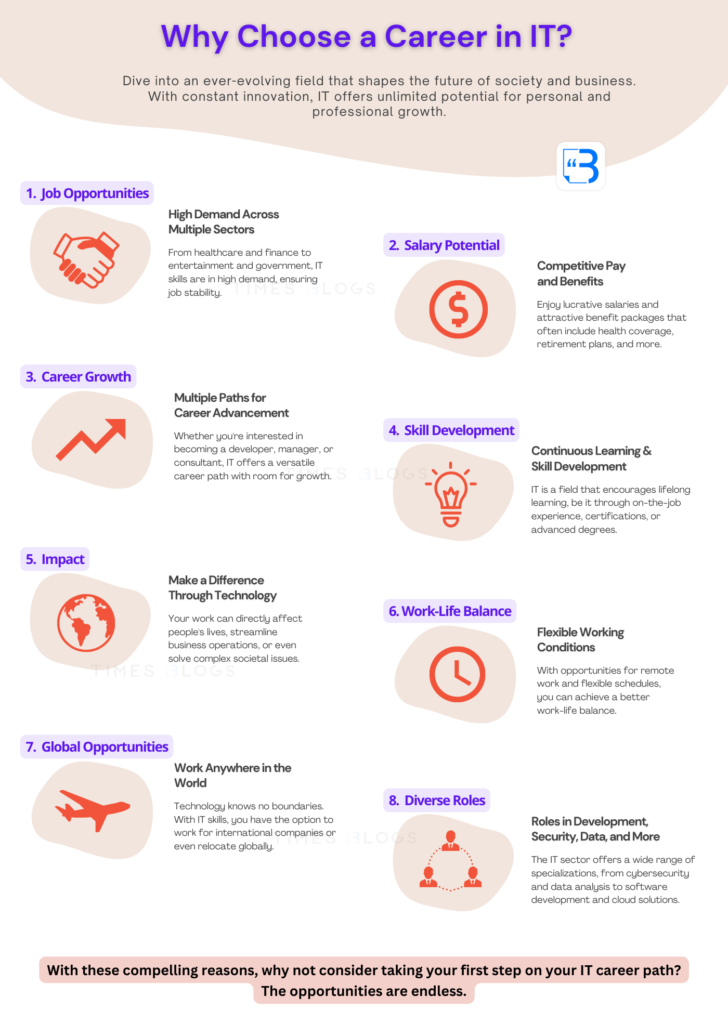In a digital age where technology intertwines with almost every aspect of our lives, the importance of Information Technology (IT) has never been more pronounced. But what does it take to carve out a successful career in this ever-evolving industry? This article aims to be your comprehensive guide to navigating the IT career path, from your first steps into the sector to scaling the ladder towards leadership roles.
The term “IT Career Path” is often thrown around, but what does it actually entail? Is it a straightforward journey, or does it come with twists and turns? In this guide, we’ll address these questions and more, offering valuable insights for anyone aiming to advance their career in IT. Whether you’re an entry-level hopeful, a mid-level professional eyeing the next rung, or an experienced veteran ready to take on executive responsibilities, this guide is designed to help you plan your future in the IT landscape.
In the following sections, we’ll delve into the specifics: from understanding why a career in IT might be the right fit for you to exploring the various roles that exist at each level. We’ll also cover the essential skills you’ll need to develop along the way and offer practical tips for ascending to leadership positions.
So, if you’re curious about the steps involved in climbing the IT career ladder, read on. This guide could be the roadmap you’ve been searching for.
Table of Contents

Why Choose a Career in IT?
In today’s interconnected world, IT isn’t just a sector—it’s the backbone of modern civilization. The demand for IT professionals spans across industries, from healthcare and finance to education and entertainment. If you’re contemplating the IT career path, you’re considering entering a domain that offers not only job security but also countless opportunities for growth. Let’s delve into why a career in IT could be the best decision you’ll ever make.
High Demand for IT Professionals
The need for qualified IT experts is omnipresent. As per the U.S. Bureau of Labor Statistics, employment in computer and information technology occupations is projected to grow much faster than the average for all occupations. That means job security and an abundance of opportunities are almost guaranteed.
Lucrative Salary Packages
One of the most enticing aspects of the IT career path is the earning potential. According to Glassdoor, IT professionals are among the highest-paid workers. The exact figures may vary depending on your role, location, and level of expertise, but rest assured, the financial rewards in this field are lucrative.
Continuous Learning and Skill Enhancement
Technology is an ever-changing landscape. What was cutting-edge today might be outdated tomorrow. This constant evolution ensures that your job will never be monotonous. You’ll continue to learn and adapt, which will not only make your work more interesting but also increase your value in the job market.
Diverse Career Paths
IT is a broad field with various specializations to choose from—be it cybersecurity, software development, data analytics, or network engineering. This diversity ensures that you can find a niche that resonates with your interests and skills.
Global Opportunities
A career in IT is not geographically confined. Skills in computer technology are universal, offering you the chance to work from anywhere—whether it’s a bustling tech hub like Silicon Valley or remotely from a beach in Bali.
Making an Impact
Lastly, IT professionals often have the chance to work on projects that have significant societal impact—be it through developing software that can improve healthcare systems or creating algorithms that make our roads safer. The work you do can and often does, make a tangible difference in people’s lives.
Choosing the IT career path can be a fulfilling and wise career move, offering high job security, substantial financial rewards, and the chance to make a genuine impact. If you’re someone who thrives on innovation, continuous learning, and diverse opportunities, then a career in IT may just be your calling.
Entry-Level Roles in IT: Your First Step on the IT Career Path
So, you’ve decided that IT is the career for you. Great choice! But where do you start? The IT industry offers a myriad of entry-level roles that serve as excellent stepping stones into this dynamic field. Below, we’ll explore some common entry-level roles that you might consider as you embark on your IT career path.
Technical Support Specialist
Responsibilities
As a Technical Support Specialist, you serve as the frontline of the IT department, directly interacting with customers or employees who face technical difficulties. Your role could include a range of duties, from basic tasks like password resets to more intricate challenges like network troubleshooting. Whether you find yourself in a dedicated call center or an in-house IT department, you are an integral part of an organization’s IT career path.
Skills Required
- Communication Skills: Clear communication is crucial in this role. You’ll often need to translate technical jargon into layman’s terms for team members or customers.
- Problem-Solving Abilities: Given that you’ll frequently encounter unique issues, strong problem-solving skills are a must-have on your IT career path.
- Emotional Intelligence: Managing stressful situations effectively and staying calm under pressure is key. You are often the first point of contact for users who may be frustrated or anxious.
- Technical Proficiency: A foundational understanding of computer systems, networks, and software is a given. This technical knowledge serves as your backbone for troubleshooting issues and advancing in your IT career path.
Career Path
A role as a Technical Support Specialist is often considered a springboard into more advanced IT positions. With sufficient experience and potentially additional certifications, you could move into roles like Technical Support Manager, Systems Administrator, or even venture into specialized fields like cybersecurity.
Average Salary
According to Payscale, the average salary for a Technical Support Specialist is around $50,000 per year. However, this figure can vary based on several factors including your location, experience, and the company you work for.
Junior Developer
Responsibilities
As a Junior Developer, you’ll have the primary responsibility of writing and maintaining code, often under the supervision of more senior team members. You’ll be actively involved in the complete development cycle, from the planning and design phase to implementation and testing. Starting with bug fixes and smaller tasks, you’ll gradually earn the trust to take on more complex projects, helping you grow on your IT Career Path.
Skills Required
- Coding Skills: Being proficient in at least one programming language like Python, Java, or JavaScript is the backbone of this role and a fundamental building block in your IT Career Path.
- Logical Thinking: Programming is as much about solving logical problems as it is about knowing the coding language. This skill is invaluable at every stage of an IT career.
- Teamwork: Software projects often require a team effort. Therefore, being able to collaborate effectively with your team is essential for career advancement.
- Attention to Detail: The ability to write error-free code and spot issues that could save hours of debugging is crucial. It’s these details that make a difference in your IT Career Path.
Career Path
Starting out as a Junior Developer provides a clear route for career progression in software development. With experience and an expanding skill set, you can move on to roles like Software Developer, Senior Developer, and eventually into leadership positions like Software Architect or even CTO (Chief Technology Officer).
Average Salary
According to Glassdoor, the average annual salary for a Junior Developer stands at around $65,000. This can vary depending on several factors, such as your geographical location, the programming languages you’re proficient in, and your body of work.
Systems Administrator
Responsibilities
A Systems Administrator plays a critical role in setting up and maintaining an organization’s IT network. Their responsibilities span various tasks, from installing and configuring hardware and software to monitoring system performance. Their work ensures that the IT systems run smoothly and securely, which is a vital function at any point in an IT Career Path.
Skills Required
- Technical Expertise: A deep understanding of operating systems, networking protocols, and server administration is crucial for success in this role and sets the foundation for further growth in your IT Career Path.
- Problem-Solving Skills: The IT landscape is fraught with challenges. Whether it’s dealing with a network outage or a problematic server, quick and effective problem-solving is essential.
- Organizational Skills: A Systems Administrator often has to juggle multiple tasks and systems simultaneously. Strong organizational skills are critical for managing these diverse responsibilities.
- Security Awareness: Ensuring the integrity and security of the IT system is a major part of the role. A strong understanding of cybersecurity protocols is important as you advance along your IT Career Path.
Career Path
With years of hands-on experience and a proven track record, Systems Administrators have multiple avenues for career advancement. You might progress to specialized roles like Network Engineer or Security Analyst. Alternatively, you could venture into managerial positions like IT Manager or Director of IT, all important milestones on your IT Career Path.
Average Salary
According to Payscale, the average salary for a Systems Administrator stands at approximately $62,000 per year. However, this figure can vary based on factors such as experience, location, and the size of the organization you work for.
Data Analyst
Responsibilities
Data Analysts serve as the linchpins of information within an organization, making them indispensable at any stage of the IT Career Path. Their main responsibilities include collecting, processing, and analyzing data to help companies make more informed decisions. A typical day might involve gathering raw data, cleaning it to ensure accuracy, and then employing statistical tools to interpret the data. The insights generated can influence a range of business activities, from marketing strategies to operational efficiency.
Skills Required
- Statistical Skills: A mastery of statistical tests and tools is not just essential but foundational for interpreting and analyzing data effectively as you advance in your IT Career Path.
- Data Visualization: Being able to present complex data in a simple, visually compelling manner enhances your value to the organization. This skill grows in significance as you proceed along your IT Career Path.
- Critical Thinking: The world is drowning in data, but not all of it is useful. The ability to discern valuable data from the noise is crucial, especially as data sets grow in size and complexity.
- Technical Proficiency: Being proficient in specialized data analysis software like SQL or Python can give you a significant advantage. These skills are often prerequisites as you move up in your IT Career Path.
Career Path
The Data Analyst role serves as a significant stepping stone to more specialized roles. As you gain experience and hone your skills, you may move into roles like Data Scientist, Business Analyst, or Data Engineer. These are key milestones on your IT Career Path, especially as businesses increasingly recognize the value of data-driven decision-making.
Average Salary
According to Glassdoor, the average salary for a Data Analyst hovers around $65,000 per year. However, your earning potential can rise substantially as you gain more experience and acquire specialized skills like machine learning or advanced statistical modeling, further solidifying your position in the IT Career Path.
Quality Assurance (QA) Tester
Responsibilities
Quality Assurance (QA) Testers play a crucial role in ensuring that software products meet the highest quality standards. They stand as the final defense before a product reaches the end-user, actively preventing bugs and inconsistencies. A typical day might involve crafting test plans, executing those tests, and diligently documenting the results to contribute to an optimized IT Career Path for software.
Skills Required
- Analytical Skills: Effectively identifying issues requires an in-depth understanding of the system’s functionality, a key skill to develop in your IT Career Path.
- Attention to Detail: With the responsibility of catching bugs and inconsistencies, a keen eye for detail is not just beneficial but essential.
- Communication Skills: Clear and accurate reporting of issues to the development teams is a must. Your communication skills grow in importance as you climb up your IT Career Path.
- Technical Skills: While not a strict requirement, having a basic understanding of programming languages can be beneficial, especially for script-based testing. This can be a valuable skill as you proceed on your IT Career Path.
Career Path
The role of a QA Tester can serve as a rewarding career starting point with several avenues for professional growth. As you gather experience, you could move up to roles like QA Analyst, QA Engineer, or even QA Manager. Specialization areas such as automated testing and security testing can offer further growth opportunities and serve as significant milestones on your IT Career Path.
Average Salary
According to Payscale, the average salary for a Quality Assurance (QA) Tester is around $55,000 per year. This can fluctuate based on a variety of factors such as geographical location, years of experience, and the industry you are involved in. However, as you gain more skills and experience, you can expect this number to rise, marking your upward trajectory in the IT Career Path.
IT Consultant (Trainee)
Responsibilities
As an IT Consultant Trainee, you’ll have the opportunity to work closely with seasoned consultants. Together, you’ll assist businesses in optimizing their technological infrastructure and solving specific IT-related challenges. Your responsibilities could include tasks such as conducting IT audits, workflow analysis, and making well-informed recommendations for software selection or the implementation of more efficient processes. In essence, you serve as the link between business requirements and IT solutions, setting the stage for a fulfilling IT Career Path.
Skills Required
- Analytical Abilities: Your role involves assessing and identifying the diverse IT needs of clients. Therefore, strong analytical skills are an integral part of your skill set and your IT Career Path.
- Communication Skills: Whether it’s relaying complex IT ideas to a client or effectively communicating with your team, clear and concise communication is a must-have skill for anyone looking to excel in their IT Career Path.
- Business Acumen: Having a good grasp of fundamental business strategies and processes enables you to offer invaluable advice and solutions, further advancing your IT Career Path.
- Technical Knowledge: Even as a trainee, a foundational understanding of IT solutions and emerging technologies can make you more effective in your role and is a positive step in your IT Career Path.
Career Path
Beginning as an IT Consultant Trainee, you’ll gain exposure to a diverse range of industries and technologies. This positions you well for various career growth options. With experience and additional skills, you could progress to roles like Senior Consultant or Project Manager. Specialized Consultant or CTO advisory roles could also be attainable if you develop deep expertise in certain technologies or sectors.
Average Salary
Based on information from Payscale, the average salary for an IT Consultant Trainee is around $55,000 per year. This can escalate considerably as you accumulate more experience, specialize in lucrative sectors, or earn advanced degrees and certifications, marking a rise in your IT Career Path.
Each of these roles offers unique opportunities to gain the experience and skills you’ll need as you advance on your IT career path. Remember, entry-level doesn’t mean the end—it’s just the beginning.

Building Skills: The Crucial First Few Years on Your IT Career Path
Congratulations on landing that entry-level role! The first few years in IT are a golden opportunity to build a skill set that will serve you throughout your career. Let’s discuss some key areas where you should focus your energy, including certifications, networking, mentorship, and more.
Certifications: The Credentials That Make a Difference
- CompTIA A+: This foundational certification covers essential IT skills and is highly recommended for Technical Support Specialists.
- CCNA (Cisco Certified Network Associate): Ideal for aspiring Network Engineers or Systems Administrators, this certification focuses on networking concepts and hardware.
- AWS Certified Solutions Architect – Associate: Geared towards those interested in cloud computing, this certification is excellent for understanding Amazon Web Services.
- Certified Ethical Hacker (CEH): If cybersecurity appeals to you, the CEH certification can provide you with a strong footing in ethical hacking.
- Microsoft Certified: Azure Fundamentals: This certification is aimed at those interested in cloud services, particularly on Microsoft’s Azure platform.
- Google Associate Cloud Engineer: An entry-level certification for Google Cloud that gives you the fundamentals of Google Cloud Platform products and services.
- Certified Information Systems Security Professional (CISSP): For those looking to dive deep into information security, this certification offers extensive knowledge and is globally recognized.
- Oracle Certified Associate, Java SE 8 Programmer (OCAJP 8): This is a foundational certification for aspiring Java Developers that covers Java basics and object-oriented programming.
- Scrum Master Certification: For those interested in agile methodologies and project management, becoming a certified Scrum Master can add a valuable credential to your resume.
- Certified Business Analysis Professional (CBAP): If you’re looking to move into a business analyst role, this certification can give you a comprehensive understanding of business analysis principles.
- Tableau Desktop Specialist: For aspiring data analysts, this certification proves your understanding of core Tableau concepts for creating and sharing visualizations.
- CompTIA Network+: This is another foundational certification focused on networking, useful for roles like Network Administrator or Systems Administrator.
Networking: Your Professional Web
- Profile Upkeep: Ensure that your LinkedIn profile is always updated with your latest achievements, certifications, and skills. A well-maintained profile attracts more professional opportunities.
- Engage: Don’t just use LinkedIn as a resume; it’s a social network. Engage with posts, share your own insights, and connect with industry professionals.
- Join Groups: There are numerous IT-focused groups where you can get advice, share your own expertise, and even find job opportunities. Participate actively in these spaces to keep a finger on the pulse of the industry.
Industry Events
- Conferences and Seminars: Physical events provide unmatched opportunities to meet and connect with like-minded professionals. They’re also excellent platforms for discovering the latest technologies and methodologies.
- Webinars: Digital events can also be very valuable and have the added advantage of being accessible from anywhere. Webinars can be a great way to deepen your industry knowledge and network with professionals you might not meet otherwise.
Company Network
- Internal Networking: The importance of networking within your own company cannot be overstated. Understanding the roles, challenges, and needs of other departments can provide you with a well-rounded view of your organization.
- Mentorship: Seek out individuals within your organization who can act as mentors or career sponsors. Their advice can be invaluable as you navigate your IT career path.
- Cross-Departmental Projects: Whenever possible, volunteer for projects that require inter-departmental collaboration. This will not only expand your internal network but also provide you with a broader understanding of the business.
Mentorship: Guidance for the Road Ahead
- Internal Mentors: Look for experienced professionals within your organization who can guide you. They can offer valuable insights that can help shape your career.
- Online Platforms: Websites like MentorCruise or LinkedIn offer mentorship programs where you can connect with experienced IT professionals willing to guide newcomers.
- Peer Mentorship: Sometimes, your peers can provide you with insights and perspectives that more experienced professionals might overlook. Consider establishing a peer mentorship relationship for mutual growth.

Soft Skills: Don’t Underestimate Their Importance
In the IT industry, technical proficiency is often the focus of many career discussions. However, soft skills—the personal attributes that enable someone to interact effectively and harmoniously with others—are just as important. Let’s delve deeper into some of these soft skills:
Communication
- Why It’s Important: In a field full of specialized terminology and complex concepts, being able to convey information clearly and effectively is crucial. This isn’t just about making presentations or writing reports; it’s also about listening and ensuring that you understand the needs and concerns of others.
- Real-world Application: Imagine you’ve developed a complex software solution that’s going to streamline operations in your company. If you can’t explain how it works and why it’s beneficial in simple terms, it’s unlikely to get the support it needs to be implemented successfully.
Problem-Solving
- Why It’s Important: IT is fundamentally about solving problems—whether they’re small, day-to-day issues or big, long-term challenges. Your ability to approach problems methodically and find effective solutions is an invaluable skill.
- Real-world Application: When a server crashes or a security breach occurs, being able to think on your feet and come up with a quick yet effective solution can make all the difference. Problem-solving isn’t just about fixing things; it’s about understanding the root cause to prevent similar issues in the future.
Adaptability
- Why It’s Important: The tech landscape is ever-changing. New programming languages emerge, old technologies become obsolete, and the needs of businesses evolve. Being flexible and willing to adapt is crucial for long-term career growth.
- Real-world Application: Today you might be working on a legacy system, and tomorrow you could be asked to migrate everything to the cloud. Being adaptable means you can transition between these different environments with relative ease, making you a more versatile and therefore more valuable employee.
By focusing on these key areas—certifications, networking, mentorship, and soft skills—you’ll be setting a strong foundation for a successful IT career path. Integrating this focus keyword into the subheadings and bullet points ensures the content is SEO-optimized, providing added value to you as you venture into the world of IT. Feel free to expand on each of these sections with personal experiences, additional advice, or interviews from industry experts for a more comprehensive guide.
Mid-Level IT Roles
As you gain experience and expertise in the IT industry, you’ll naturally aspire to move up the career ladder. Mid-level roles offer not only better compensation but also more responsibility and a greater range of projects. Here’s an overview of some common mid-level roles in the IT sector to help you make an informed decision about the next step on your IT career path.
Project Manager
Responsibilities
As an IT Project Manager, you’re an important milestone in the IT Career Path. You are at the helm of planning, executing, and closing projects. Your tasks include defining the project scope, setting objectives, budgeting, and assigning responsibilities to team members. Ensuring that everyone is on the same page and that projects are successfully completed on time and within budget is a crucial responsibility on your IT Career Path.
Skills Required
- Leadership Skills: Effective leadership is essential in this role and any advanced roles you might aim for in your IT Career Path.
- Communication Skills: Clear communication is vital as you’ll bridge the gap between different departments and stakeholders.
- Organizational Skills: The ability to manage multiple tasks and deadlines is indispensable.
- Risk Management: Identifying and managing potential risks are critical for the successful completion of any project.
Career Path
As an IT Project Manager, you have numerous avenues for growth along your IT Career Path. You can progress into higher managerial roles such as Senior Project Manager, Program Manager, or even executive roles like Chief Technology Officer (CTO). Specializations like Agile and Scrum can further broaden your career prospects.
Average Salary
According to Glassdoor, the average salary for an IT Project Manager is approximately $90,000 per year. This salary can vary based on factors such as experience, location, and project complexity but could see an increase as you move along your IT Career Path.
Software Engineer
Responsibilities
In the landscape of IT Career Paths, becoming a Software Engineer is a significant step. Software Engineers are responsible for the entire life cycle of software development, which includes gathering requirements, designing solutions, coding, testing, and finally, deployment. In addition to these tasks, they often mentor Junior Developers and review code to ensure quality and functionality.
Skills Required
- Programming Languages: Mastery over one or more languages like Java, Python, or C++ is crucial.
- Problem-Solving: The ability to identify issues and create effective solutions is key.
- Collaboration: Good teamwork skills are important as you’ll often work in teams.
- Attention to Detail: Ensuring code quality is paramount and requires keen attention to detail.
Career Path
As a Software Engineer, you have a well-defined IT Career Path ahead of you. Career progression can lead to roles like Senior Software Engineer, Lead Developer, or Software Architect. Specializations in high-demand areas like machine learning or blockchain can also diversify and elevate your IT Career Path.
Average Salary
According to Payscale, the average salary for a Software Engineer is about $95,000 per year. Your earning potential can fluctuate based on skill level, experience, and location but can see a steady increase as you advance along your IT Career Path.
Security Analyst
Responsibilities
As a Security Analyst, you are among the critical roles in the IT Career Path focused on cybersecurity. You’ll be the guardian of information systems, responsible for monitoring, detecting, reporting, and counteracting cybersecurity threats to an organization. Your tasks include not just installing firewalls and data encryption but also implementing other preventative measures and conducting regular security audits.
Skills Required
- Cybersecurity Knowledge: A deep understanding of cybersecurity protocols and measures is crucial.
- Analytical Skills: Your role will involve analyzing security data and trends to identify vulnerabilities.
- Attention to Detail: In the realm of cybersecurity, small oversights can result in major security breaches.
- Communication Skills: The ability to articulate complex security matters in simple terms to non-technical staff is important.
Career Path
Within the IT Career Path, Security Analysts have several avenues for advancement. You could move up to roles like Security Manager, Security Architect, or even Chief Information Security Officer (CISO). Specializations in specific areas such as ethical hacking or compliance could further enhance your IT Career Path.
Average Salary
According to Payscale, the average salary for a Security Analyst is around $75,000 per year. As you progress in your IT Career Path, this figure can rise substantially with experience, specialized expertise, and industry certifications.
Data Engineer
Responsibilities
Data Engineers hold a vital position in the IT Career Path, being responsible for the architecture, construction, and maintenance of large-scale processing systems and databases. Your role is to design, construct, install, and maintain highly scalable data management systems. These systems facilitate the collection, storage, and analysis of data, making you an integral part of any data-driven organization.
Skills Required
- Database Management: A mastery of SQL, as well as a strong familiarity with NoSQL databases, is essential in this role.
- Data Warehousing Solutions: Proficiency in solutions like Amazon Redshift, BigQuery, or Snowflake can significantly benefit your workflow.
- Programming: Knowledge of programming languages like Python or Java is often crucial for scripting and data manipulation tasks.
- Big Data Technologies: Hands-on experience with technologies like Hadoop and Spark is commonly required.
Career Path
The IT Career Path offers several routes for Data Engineers. You can progress to specialized roles like Data Architect or Data Scientist. Managerial roles such as Head of Data Engineering are also within reach. Specializing in fields like Big Data or Machine Learning can offer additional opportunities for career growth within the IT Career Path.
Average Salary
According to Glassdoor, the average salary for a Data Engineer is around $100,000 per year. As you climb the IT Career Path, you can expect this figure to increase, particularly if you specialize in high-demand areas or work in certain industries or locations.
Business Analyst (IT)
Responsibilities
As a Business Analyst in an IT setting, you occupy a pivotal role in the IT Career Path. Your primary duty is to serve as a bridge between business objectives and the technological solutions required to meet them. You’ll analyze business processes, elicit and document requirements, and facilitate the implementation of technology solutions tailored to solve business problems.
Skills Required
- Analytical Skills: The ability to scrutinize business processes and recommend technological improvements is key.
- Technical Understanding: A strong grasp of existing technologies and their impact on the business is essential.
- Stakeholder Communication: Skill in communicating both technical and non-technical aspects of a project to various stakeholders is crucial.
- Project Management: Familiarity with project management tools and methodologies can enhance your role within the IT Career Path.
Career Path
As you progress on your IT Career Path, you’ll find a variety of career options open to you. Business Analysts can move into higher-level positions such as Senior Business Analyst, Business Consultant, or even Chief Information Officer (CIO). Specializing in areas like ERP or Business Intelligence can further bolster your career prospects.
Average Salary
According to Payscale, the average salary for Business Analysts in the IT sector is around $70,000 per year. However, as you advance in your IT Career Path, this figure can vary based on factors like industry, location, and specific skill sets.
Systems Architect
Responsibilities
As a Systems Architect, your primary role involves designing and creating the architecture of computing systems within an organization. Your designs must consider important factors like scalability, performance, and security. You play a key role in ensuring that the technical infrastructure is aligned with the company’s business objectives, an essential part of any IT Career Path.
Skills Required
- Technical Depth: A deep understanding of systems architecture is critical, including both hardware and software components.
- Strategic Thinking: Your role is vital for aligning technical strategies with business objectives, a skill that is highly valued on the IT Career Path.
- Leadership Skills: Often, you’ll find yourself leading a team of engineers or collaborating closely with department heads to shape the architectural vision.
- Security Awareness: A solid grasp of security protocols is necessary to integrate them effectively into the system architecture.
Career Path
As you make strides on your IT Career Path, you’ll find that Systems Architects can progress into roles like Chief Architect or Chief Technology Officer (CTO). Those who choose to specialize in specific domains, such as cloud architecture or cybersecurity, may find niche roles that command higher salaries.
Average Salary
According to Glassdoor, Systems Architects can expect an average salary of approximately $110,000 per year. As you advance further along your IT Career Path, the salary can vary significantly depending on factors like industry, location, and specialized expertise.
Each of these mid-level roles offers its unique set of challenges and rewards. Importantly, they all provide an opportunity for you to specialize in a particular area, offering you a focused pathway on your IT career path. As always, these profiles can be enriched with additional insights, interviews, or case studies to give a comprehensive perspective. By naturally incorporating the focus keyword “IT Career Path,” this section remains SEO-friendly while offering value to anyone looking to advance in the IT field.
Climbing Up the IT Career Path: Beyond Technical Skills
As you ascend the IT career ladder, it becomes increasingly clear that technical prowess alone won’t cut it. Soft skills like communication, leadership, and business acumen become equally vital, if not more so. These qualities enable you to work effectively with your team, understand the broader context of your projects, and make strategic decisions that align with your organization’s goals. Let’s delve into why these skills are important and how they can significantly affect your trajectory on the IT career path.
Communication
- Importance: Whether you’re a Software Engineer needing to explain complex algorithms to non-tech colleagues, or a Project Manager giving status updates to stakeholders, effective communication is crucial.
- Applications: Team meetings, client presentations, and even writing emails all require good communication skills.
- Improvement Tips: Consider workshops, public speaking courses, or Toastmasters to improve this skill.
Leadership
- Importance: As you move up, leadership skills become a necessity. Not only will you lead projects, but you’ll also become responsible for guiding and mentoring your team.
- Applications: Decision-making, conflict resolution, and strategic planning are areas where leadership skills come into play.
- Improvement Tips: Leadership training programs or learning from a mentor can help you cultivate these skills.
Business Acumen
- Importance: Understanding the business aspect of your organization enables you to align your technical solutions with business objectives.
- Applications: Budgeting, resource allocation, and even choosing which projects to prioritize are influenced by your level of business acumen.
- Improvement Tips: Business courses or an MBA can significantly boost your understanding of business operations and strategy.
Soft skills may not show up explicitly in your job description, but they are often the unsung heroes that propel you further in your IT career path. By focusing on improving these skills, you set yourself up for higher-level roles that demand a more diverse skill set. This section, featuring bullet points and our focus keyword “IT Career Path,” serves to emphasize the importance of these non-technical skills while also optimizing for SEO. Enhance this section by adding real-life scenarios or interviews with IT professionals who can vouch for the importance of these skills.

Transitioning to Leadership Roles on the IT Career Path
Once you’ve honed both your technical and soft skills and have several years of experience under your belt, you may begin to consider transitioning into leadership roles. This move signifies not just a change in title but a shift in responsibilities, impact, and vision. So, when should you consider making the leap, what skills should you build, and what are some of the leadership roles you could aim for? Let’s explore.
When to Consider a Transition
- Years of Experience: Most leadership roles in IT require a significant amount of experience, often at least 10 years.
- Skillset: A strong technical background coupled with soft skills like communication and leadership make you a good candidate.
- Passion for Leadership: An inherent desire to lead, make decisions, and guide a team or department are good indicators that you’re ready.
- Alignment with Goals: If your long-term career goals involve decision-making, strategy, and influence, it’s time to think about transitioning.
Skills to Build
- Strategic Thinking: Learn to see the bigger picture, beyond just the technical aspects.
- People Management: As a leader, you’ll be directly responsible for a team or even an entire department. Knowing how to manage, motivate, and grow talent is crucial.
- Business Strategy: Understanding how the company operates, makes money, and competes in the marketplace will make you a more effective leader.
- Financial Acumen: Budgets, P&L statements, and fiscal responsibility will become part of your role.
Leadership Roles to Consider
Chief Technology Officer (CTO)
The CTO is responsible for the technological direction of the company. This involves not just overseeing the engineering team, but also making strategic decisions about product development, technology stack, and R&D. It’s a role that combines deep technical knowledge with strategic vision.
Chief Information Officer (CIO)
The CIO manages the company’s internal IT infrastructure and operations. While the role can overlap with that of the CTO in some organizations, the focus is usually more on internal systems, IT strategy, and digital transformation. A CIO ensures that technology is effectively applied to achieve the business goals.
Chief Security Officer (CSO)
The CSO is in charge of an organization’s information security program. This includes risk management, compliance, and ensuring that security protocols are in line with the company’s objectives. It’s a role that has gained prominence with the rise in cybersecurity threats and regulatory requirements.
IT Director
An IT Director oversees the IT department and works to ensure that all technology activities align with the organization’s goals. This role can be broad and may include tasks ranging from budgeting to strategic planning and even hands-on management of key projects.
Program Manager
A Program Manager takes the project management role to a higher level, often overseeing multiple related projects to ensure they align with organizational objectives. The role involves more strategic planning and business alignment compared to traditional project managers.
Head of Engineering
The Head of Engineering is responsible for the overall leadership of the engineering division, overseeing software development, system architecture, and sometimes even hardware development. They work closely with the CTO and other leaders to ensure engineering efforts align with company strategy.
Chief Data Officer (CDO)
The CDO is responsible for managing the company’s data as a strategic asset. This involves everything from data governance and data quality management to analytics and data strategy. The CDO plays a key role in decision-making processes by leveraging data insights.
Transitioning into a leadership role is a significant milestone on your IT career path. Being prepared for this transition by understanding when to consider it and what skills to build is essential. With our focus keyword “IT Career Path” naturally integrated into this section for SEO optimization, this guide serves as an indispensable resource for aspiring IT leaders. To provide a more complete picture, consider adding interviews with IT leaders who have successfully made this transition. They can offer invaluable insights and tips on how to navigate this crucial phase in your career.
IT Career Path Success Stories: Real-Life Case Studies
Understanding the theory of career progression is one thing; seeing how it plays out in real life can be incredibly insightful. Below are case studies of individuals who have successfully navigated the IT career path, rising from entry-level roles to leadership positions. These stories serve as practical guides and motivation for anyone looking to climb the IT career ladder.
Case Study 1: From Junior Developer to CTO
Initial Position: Junior Developer
Leadership Role: Chief Technology Officer (CTO)
Journey:
Jane started her career as a Junior Developer at a small software company. Her commitment to continuous learning led her to acquire several certifications and to master multiple programming languages. After 4 years, she transitioned to a mid-level Software Engineer role at a larger company. Her leadership abilities soon became apparent, and she was promoted to Head of Engineering. After a decade in the field, Jane became the CTO of a leading tech firm, guiding the company’s technology strategy.
Takeaways:
- Investing in both technical and leadership skills is essential.
- Timing and strategic job changes can help accelerate career progression.
Case Study 2: From IT Support Specialist to Chief Information Officer (CIO)
Initial Position: IT Support Specialist
Leadership Role: Chief Information Officer (CIO)
Journey:
Mike started his career as an IT Support Specialist, troubleshooting hardware and software issues for a healthcare provider. Recognizing the value of networking, he built relationships that eventually led to a Systems Administrator position. Mike also pursued an MBA to deepen his business acumen. He rose through the ranks to become an IT Director before finally stepping into the role of CIO, where he now oversees the entire IT strategy for a large healthcare organization.
Takeaways:
- Networking can open doors you might not have considered.
- Complementary education (like an MBA) can be a valuable asset in leadership roles.
Case Study 3: From Security Analyst to Chief Security Officer (CSO)
Initial Position: Security Analyst
Leadership Role: Chief Security Officer (CSO)
Journey:
Sarah began her career as a Security Analyst, where she developed a passion for cybersecurity. Over the years, she earned multiple security certifications and became a well-respected expert in her field. Leveraging her skills and expertise, she transitioned into more managerial roles, leading a team of security experts. Eventually, her comprehensive understanding of cybersecurity risks and governance led her to become a CSO for a multinational corporation.
Takeaways:
- Specializing in a niche area can set you apart.
- Certifications can provide credibility and open opportunities.
These IT career path success stories illustrate that there are multiple routes to the top, each with its own set of challenges and opportunities. Optimized for SEO with our focus keyword “IT Career Path,” this section provides real-world examples to guide and inspire your own career trajectory. To provide an even more comprehensive picture, consider adding interviews or video testimonials from the individuals profiled.
Case Study 4: From Systems Administrator to IT Director
Initial Position: Systems Administrator
Leadership Role: IT Director
Journey:
Alex started out managing servers and network resources as a Systems Administrator for a mid-sized retail chain. Recognizing the importance of business processes, he took on additional roles that involved project management and strategic planning. Over time, he expanded his skill set by earning certifications in both technical and management disciplines. These credentials, along with a solid track record, eventually led to a role as IT Director for a multinational retail corporation.
Takeaways:
- Versatility and the willingness to take on additional responsibilities can be advantageous.
- Continual learning, through certifications or other avenues, is crucial for upward mobility.
Case Study 5: From Data Engineer to Chief Data Officer (CDO)
Initial Position: Data Engineer
Leadership Role: Chief Data Officer (CDO)
Journey:
Kim started her career as a Data Engineer, working on complex data pipelines and analytics for a fintech startup. Recognizing the strategic value of data, she pursued further studies in data science and business strategy. She eventually moved into a Business Analyst role where she could blend her technical skills with business acumen. Her unique skill set and understanding of data’s role in business strategy made her the perfect candidate for a CDO role at a leading financial institution.
Takeaways:
- The ability to bridge the technical and business sides of an organization is highly valuable.
- Further studies, even while working, can add another layer of expertise and open doors to leadership roles.
By expanding on our previous case studies with these additional examples, we’re providing a fuller picture of how diverse and dynamic the IT career path can be. Whether it’s by gaining new skills, taking educational detours, or leveraging networking opportunities, there are myriad ways to climb the career ladder in IT. Each of these stories is a testament to the multifaceted approaches one can take to achieve leadership roles in IT. This section, optimized with our focus keyword “IT Career Path,” aims to inspire and guide you in carving your own path to success.
Conclusion
The journey along the IT career path is as varied as the individuals who embark on it. From your first steps in entry-level roles like Technical Support Specialist and Junior Developer, to mid-level positions such as Project Manager and Security Analyst, all the way to leadership roles like CTO or CIO—each stage has its own set of challenges, opportunities, and rewards.
Key Takeaways
- Entry-Level Roles: The foundation of your career begins with roles that may focus on specialization, whether it’s coding, system administration, or customer support.
- Building Skills: As you gain experience, aim for certifications, mentorships, and networking opportunities to boost both your skill set and your visibility in the industry.
- Mid-Level Roles: This is where you start to take on more responsibilities and have a broader impact. Your role is more aligned with business goals and may involve team leadership.
- Beyond Technical Skills: As you climb higher, skills like strategic thinking, business acumen, and leadership become just as essential as your technical skills.
- Leadership Roles: CTO, CIO, CSO, and other high-ranking positions require a blend of experience, skill, and vision. Your decisions here can influence not just your team but the entire organization.
The IT career path is far from linear—it’s a dynamic journey that can be tailored to your individual interests, skills, and ambitions. From those initial steps into the world of IT to the pivotal move into leadership, the road is paved with opportunities for those willing to seize them.
Thank you for taking the time to navigate the complexities of the IT career path with us. To those on this journey: May your path be both challenging and rewarding, leading you to the heights of success in the IT world.




